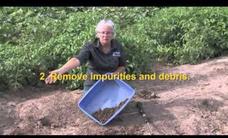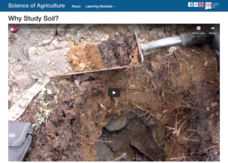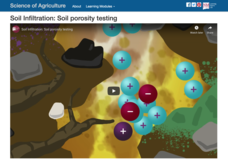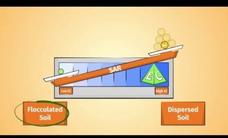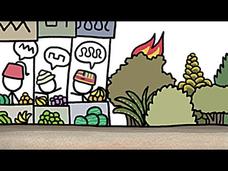Curated Video
Abiotic Factors in Ecosystems
What happens when non-living factors in an ecosystem are altered, such as rainfall or air quality? Biology - Ecosystems - Learning Points. An ecosystem is a living system interacting with its physical habitat. Changes in biotic and...
New Mexico State University
Soil Sampling: Random Sampling a Small Field with Hammer Probe
There's some serious science behind farming! A quick video lesson presents the process of collecting a random field soil sample for analysis. Instruction includes what a random sample looks like as well as how to prepare the sample for...
New Mexico State University
Soil Sampling: Soil Variability
Not all soil is created equal. Learners examine what to look for in a soil sample to identify key characteristics that don't require lab testing. They see that it's easy to verify observations by comparing the samples to a soil map.
New Mexico State University
Soil Sampling: Random Sampling Across a Large Field with Hammer Probe
What defines a random sample? Scholars learn how to collect a random soil sample from a large field. The narrator explains the importance of ensuring the sample is random and shows how to create a random sample before sending it to the lab.
New Mexico State University
Properties of Soil: Particle Size
Soil is 25 percent air on average. Learners may have a difficult time accepting that fact without a visual to demonstrate the property. A quick video lesson uses a model to show how this percentage is true and also discusses the...
Learning Games Lab
Why Study Soil?
Some scientists spend their entire careers analyzing and learning about soils. An interesting video lesson provides an overview of what soil scientists do and why. Pupils learn how soil analysis connects to other branches of science...
Learning Games Lab
Soil Infiltration: Soil Porosity Testing
Soil pollution has a longer reach than may seem possible. A video presentation demonstrates how a seemingly isolated soil contamination spreads and even reaches waterways. The lesson demonstrates how scientists conduct porosity tests...
Learning Games Lab
Unavailability of Water in Saline Soils
Viewers of a short video learn about salt and water molecules and how their characteristics determine how they interact with each other. Then, they watch a simulation of how the interaction limits the uptake of water in plant roots and...
Learning Games Lab
The Olsen Test for Phosphorus
A short video teaches viewers about the Olsen Test, a soil test specific for plants grown in arid regions. The soil in arid regions has a higher pH and plants require special treatment to thrive. The video provides information about the...
Learning Games Lab
Properties of Soil
How do the different types of soil allow water to flow? Scholars compare flocculated and dispersed soils and their ability to move water through the soil. Silt, sand, and clay particles clump together and create large pores in the soil...
MinuteEarth
Why Poor Places Are More Diverse
Poor soil actually grows the most diverse plants. Although this sounds like a contradictory statement, the video lesson explains how and why this is true. Learners discover how rich soils typically cater to the stronger, faster-growing...
Fuse School
Acid Rain
Rain, rain, go away ... at least if your pH is below six! The sixth installment in a series of seven videos teaching about pollution and our atmosphere shows learners the facts about acid rain. Embedded pauses allow you to stop and check...
SciShow Kids
What's the Dirt on ... Dirt?
Dirt or soil? What's the difference? Actually, dirt is soil as explained by the video's high-energy speaker who goes on to emphasize its importance. She describes the composition of soil as minerals, water, air,...
Annenberg Foundation
Annenberg Learner: Investigating Soil Composition
This video explores different properties such as rock type, the age of soil, vegetation, and the climate can all contribute to soil composition. [5:43]

